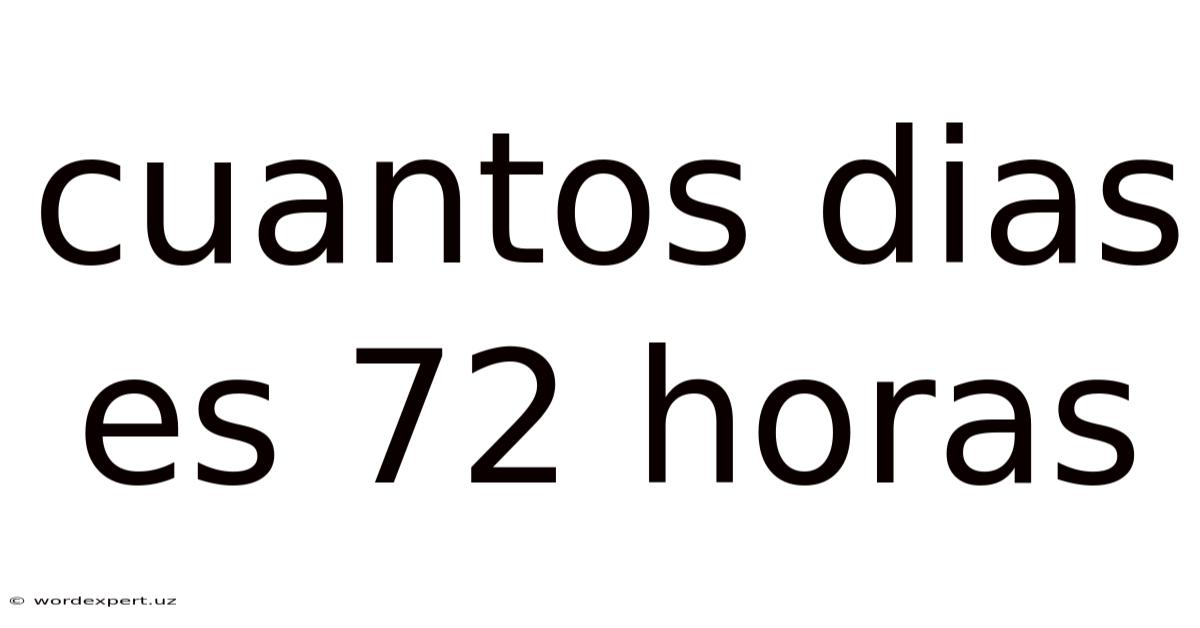Cuantos Dias Es 72 Horas
wordexpert
Sep 15, 2025 · 4 min read

Table of Contents
Cuántos días es 72 horas? Understanding Time Measurement
The question, "Cuántos días es 72 horas?" translates from Spanish to English as "How many days is 72 hours?" This seemingly simple question touches upon fundamental concepts of time measurement and can be surprisingly nuanced depending on the context. This article will comprehensively explore this question, providing not only the answer but also a deeper understanding of time calculations and their applications.
Understanding the Basics: Days and Hours
Before diving into the calculation, let's establish the fundamental relationship between days and hours. A day is a commonly used unit of time measurement, typically defined as the period of time it takes for Earth to complete one rotation on its axis. This period is approximately 24 hours. Therefore, the conversion factor we'll use is:
- 1 day = 24 hours
This simple equivalence is the key to solving our problem.
Calculating the Number of Days in 72 Hours
With the conversion factor established, calculating how many days are in 72 hours is straightforward:
- Divide the total hours by the number of hours in a day: 72 hours / 24 hours/day = 3 days
Therefore, 72 hours is equal to 3 days.
This calculation is applicable in most scenarios where a standard 24-hour day is considered.
Beyond the Simple Calculation: Considering Context and Nuances
While the basic calculation is straightforward, the interpretation can become more nuanced depending on the context. Let's explore some considerations:
-
Starting Point: The calculation assumes a continuous 72-hour period. If you are counting from a specific starting time, the exact days involved will depend on the starting point. For instance, 72 hours starting at 12:00 PM on Monday will end at 12:00 PM on Wednesday.
-
Time Zones: For international contexts, time zones must be considered. A 72-hour period starting in one time zone will not end at the same calendar day in a different time zone. This difference becomes especially relevant for long durations spanning multiple time zones.
-
Leap Seconds: While extremely rare, leap seconds are occasionally added to Coordinated Universal Time (UTC) to account for variations in Earth's rotation. These leap seconds affect the precise length of a day, but the impact on a 72-hour period is negligible for most practical purposes.
-
Practical Applications: Understanding the relationship between days and hours is crucial in various fields:
- Project Management: Estimating project timelines often involves converting hours into days or weeks.
- Travel Planning: Calculating travel times often requires converting hours into days to determine the number of days needed for a trip.
- Medical Treatment: Doctors and nurses often use time measurements in hours and days to track medication schedules and patient recovery.
- Manufacturing and Production: Production cycles are frequently measured in terms of hours worked per day and total days needed to complete a production run.
- Scientific Research: Many scientific experiments and observations involve monitoring processes over hours and days.
Expanding the Understanding: Exploring Other Time Units
To further solidify our understanding, let's explore the relationships between other time units:
- Minutes and Hours: There are 60 minutes in 1 hour.
- Seconds and Minutes: There are 60 seconds in 1 minute.
- Weeks and Days: There are 7 days in 1 week.
- Months and Days: The number of days in a month varies (28, 29, 30, or 31 days).
- Years and Days: There are approximately 365 days in a year (366 in a leap year).
Understanding these relationships allows for more complex time calculations. For example, we can convert 72 hours into minutes:
72 hours * 60 minutes/hour = 4320 minutes
Or into seconds:
4320 minutes * 60 seconds/minute = 259,200 seconds
Frequently Asked Questions (FAQs)
Q: Is it always exactly 3 days?
A: While the calculation yields 3 days, the precise calendar days involved depend on the starting time and time zone, as explained earlier.
Q: How can I convert other durations into days?
A: Use the conversion factors mentioned above. Divide the total duration by the number of hours (24), minutes (1440), or seconds (86400) in a day, depending on the given unit.
Q: What if I need to calculate a period that includes parts of days?
A: You can express the result as a combination of days and hours (e.g., 2 days and 12 hours). For more precise calculations, you might use decimals representing fractions of a day. For example, 36 hours is 1.5 days.
Q: Are there any online tools to help with time calculations?
A: Numerous online calculators and converters can assist with time conversions between different units.
Conclusion: Mastering Time Calculations
Understanding how to convert hours into days is a fundamental skill with broad applications across various fields. While the calculation itself is straightforward, appreciating the nuances related to starting times, time zones, and the context of the calculation is crucial for accurate and effective application. By mastering these concepts, you can approach time-related tasks with increased confidence and precision. The next time you encounter a question like "Cuántos días es 72 horas?", you'll be well-equipped to not only provide the answer but also to explain the underlying principles. Remember, the simple answer is 3 days, but a deeper understanding unlocks a world of practical applications and problem-solving abilities.
Latest Posts
Latest Posts
-
Cuantas Libras Son 70 Kg
Sep 15, 2025
-
3 Out Of 5 Grade
Sep 15, 2025
-
Cash Flow From Operations Calculator
Sep 15, 2025
-
How Long Till 1 Pm
Sep 15, 2025
-
Good Uv Index For Tanning
Sep 15, 2025
Related Post
Thank you for visiting our website which covers about Cuantos Dias Es 72 Horas . We hope the information provided has been useful to you. Feel free to contact us if you have any questions or need further assistance. See you next time and don't miss to bookmark.